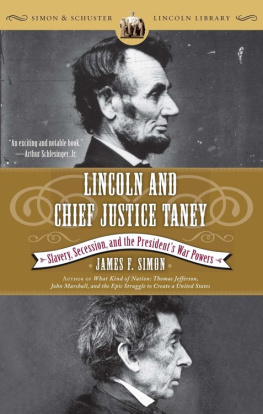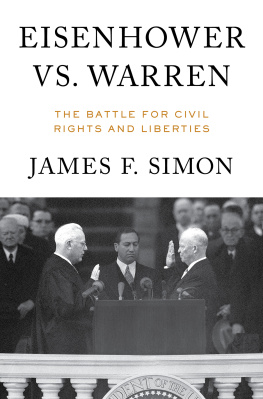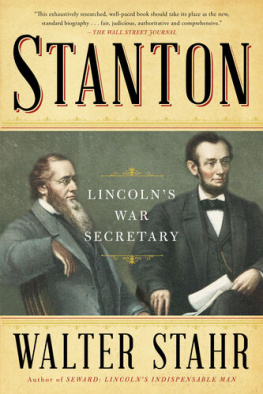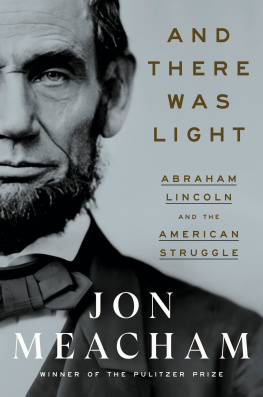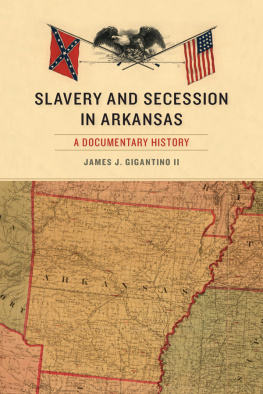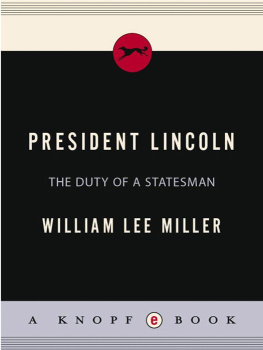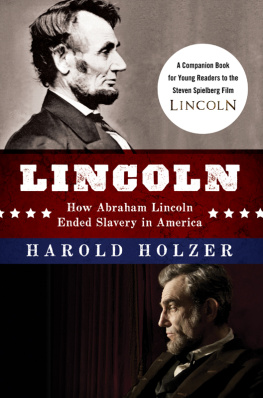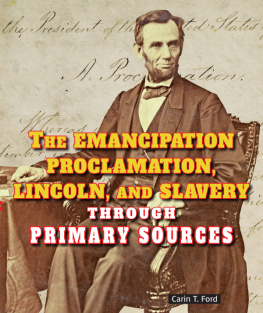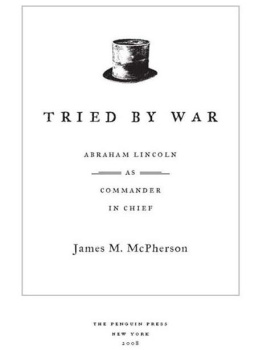James F. Simon - Lincoln and Chief Justice Taney: Slavery, Secession, and the President’s War Powers
Here you can read online James F. Simon - Lincoln and Chief Justice Taney: Slavery, Secession, and the President’s War Powers full text of the book (entire story) in english for free. Download pdf and epub, get meaning, cover and reviews about this ebook. year: 0, genre: Politics. Description of the work, (preface) as well as reviews are available. Best literature library LitArk.com created for fans of good reading and offers a wide selection of genres:
Romance novel
Science fiction
Adventure
Detective
Science
History
Home and family
Prose
Art
Politics
Computer
Non-fiction
Religion
Business
Children
Humor
Choose a favorite category and find really read worthwhile books. Enjoy immersion in the world of imagination, feel the emotions of the characters or learn something new for yourself, make an fascinating discovery.
- Book:Lincoln and Chief Justice Taney: Slavery, Secession, and the President’s War Powers
- Author:
- Genre:
- Year:0
- Rating:4 / 5
- Favourites:Add to favourites
- Your mark:
- 80
- 1
- 2
- 3
- 4
- 5
Lincoln and Chief Justice Taney: Slavery, Secession, and the President’s War Powers: summary, description and annotation
We offer to read an annotation, description, summary or preface (depends on what the author of the book "Lincoln and Chief Justice Taney: Slavery, Secession, and the President’s War Powers" wrote himself). If you haven't found the necessary information about the book — write in the comments, we will try to find it.
James F. Simon: author's other books
Who wrote Lincoln and Chief Justice Taney: Slavery, Secession, and the President’s War Powers? Find out the surname, the name of the author of the book and a list of all author's works by series.
Lincoln and Chief Justice Taney: Slavery, Secession, and the President’s War Powers — read online for free the complete book (whole text) full work
Below is the text of the book, divided by pages. System saving the place of the last page read, allows you to conveniently read the book "Lincoln and Chief Justice Taney: Slavery, Secession, and the President’s War Powers" online for free, without having to search again every time where you left off. Put a bookmark, and you can go to the page where you finished reading at any time.
Font size:
Interval:
Bookmark:

What Kind of Nation: Thomas Jefferson, John Marshall,
and the Epic Struggle to Create a United States
The Center Holds: The Power Struggle Inside the Rehnquist Court
The Antagonists: Hugo Black, Felix Frankfurter, and
Civil Liberties in Modern America
Independent Journey: The Life of William O. Douglas
The Judge
In His Own Image: The Supreme Court in Richard Nixons America


SIMON & SCHUSTER
Rockefeller Center
1230 Avenue of the Americas
New York, NY 10020
Copyright 2006 by James F. Simon
All rights reserved,
including the right of reproduction
in whole or in part in any form.
SIMON & SCHUSTER and colophon are registered trademarks of Simon & Schuster, Inc.
Designed by Paul Dippolito
Library of Congress Cataloging-in-Publication Data
Simon, James F.
Lincoln and Chief Justice Taney: slavery, secession, and the presidents war powers / James F. Simon.
p. cm.
Includes bibliographical references and index.
1. SlaveryLaw and legislationUnited StatesHistory. 2. Executive powerUnited StatesHistory. 3. War and emergency powersUnited StatesHistory. 4. SecessionUnited StatesHistory. 5. Lincoln, Abraham, 18091865. 6. Taney, Roger Brooke, 17771864. I. Title.
KF4545.S5S55 2006
342.73087dc22 2006044399
ISBN-13: 978-0-7432-9846-9
ISBN-10: 0-7432-9846-2
Visit us on the World Wide Web:
http://www.SimonSays.com
To Marcia
and our wonderful family
P resident Abraham Lincoln and Chief Justice Roger Brooke Taney bitterly disagreed on three fundamental issuesslavery, secession, and Lincolns constitutional authority during the Civil War. But had they known each other in less perilous times, they might have been friends, or at least respectful adversaries. In fact, they had much in common.
Lincoln and Taney were homely physical specimenstall, gaunt, slightly cadaverous figures, usually attired in drab, ill-fitting clothes. Each man believed in a divine design that guided him, though Lincoln shirked organized religion while Taney was a devout Catholic. Both men were known for their personal integrity, fairness, and compassion for those less fortunate than themselves. Self-effacing in public, they possessed an unrelenting will to succeed.
In their prime, Taney and Lincoln were among the best litigators in their respective states of Maryland and Illinois. Without flourish, Taney demonstrated the extraordinary ability to lay the facts and law of a case bare before a judge or jury. Lincoln often embroidered his major legal points with folksy stories, but he never lost sight of the argument that would win the case for his client.
Both men disapproved of the institution of slavery. As a young lawyer, Taney freed his slaves and pronounced slavery immoral in a Frederick, Maryland, courtroom. Since childhood, Lincoln had considered slavery wrong and never wavered in his conviction. Taney and Lincoln were actively involved in colonization societies whose purpose was to remove free blacks (including, they hoped, an increasing number of emancipated slaves) from the United States to be resettled in a self-governing colony in Africa. But as lawyers, they defended the property rights of slaveowners under state laws that protected slavery.
Taney and Lincoln agreed on the need for a strong Union. Each was active in state politics and was considered a moderate, though they followed national leaders with very different philosophies. Taney campaigned vigorously for the populist Democrat Andrew Jackson in 1828. Like Jackson, Taney was suspicious of vested corporate interests. After Jackson was elected president, he appointed Taney to be his Attorney General and, later, Secretary of the Treasury. Together, Jackson and Taney fought the Second Bank of the United States, which they believed symbolized autocratic corporate power. When Chief Justice John Marshall died, Taney was Jacksons choice to replace him.
Lincolns political hero, Kentuckys Henry Clay, challenged Jackson in his reelection bid for the presidency in 1832. The twenty-three-year-old Lincoln (who was a generation younger than Taney) supported Clays American System, which defended the Bank of the United States as essential to the economic prosperity of the country. After Clay lost the 1832 election, Lincoln served four terms in the Illinois legislature and became a successful Springfield lawyer. Throughout those years, he remained loyal to Clay, supporting him in two more losing efforts to win the presidency.
The issue of slavery did not dominate the national political debate during the 1840s, as it would the next decade. Taney and Lincoln took cautious public positions on slavery in the forties. As Chief Justice, Taney carefully steered the Court away from expansive decisions when slavery was an issue, insisting that the relevant state law governed. In his single term in the House of Representatives in the late forties, Lincoln did not take a leadership role on the slavery issue. His only initiative on the subject was to propose a referendum for the District of Columbia that abolished slavery, but enforced the Fugitive Slave Law and compensated slaveowners who freed their slaves. His compromise proposal did not satisfy either abolitionists or pro-slavery members of Congress and was never formally introduced.
During the 1850s, Taney and Lincoln moved to center stage in the increasingly rancorous national debate over slavery. In his Dred Scott opinion, Taney declared that the U.S. Constitution did not grant the black man any rights that the white man was bound to honor. Taney also held that Congress could not prohibit the spread of slavery in the western territories. Shortly after Taney announced the Courts Dred Scott decision in 1857, Lincoln attacked it as a warped judicial interpretation of the framers intent. Lincoln made his opposition to the Courts decision a major theme in his campaign for the Senate in 1858. In the famous Lincoln-Douglas debates, Lincoln denounced the Dred Scott decision and accused Douglas and Taney of being members of a pro-slavery national conspiracy.
In his presidential inaugural address in 1861, Lincoln insisted that the South had no legal right to secede. Chief Justice Taney disagreed. He not only believed that secession was legal, but also that a peaceful separation of North and South, with each section forming an independent republic, was preferable to civil war. Once eleven states in the South had seceded, Lincoln broadly interpreted his constitutional powers as commander in chief to prosecute the war. Chief Justice Taney vociferously dissented, accusing Lincoln of assuming dictatorial powers in violation of the Constitution.
This book will trace the long, sometimes tortuous journeys that brought Lincoln and Taney to their final judgments, and actions, on the issues that threatened the survival of the United States.
R oger Brooke Taney was born on St. Patricks Day, 1777, in a three-story white clapboard house set on the crest of a gentle hill overlooking the Patuxent River in southern Maryland. Taneys birthplace had served as home to five generations of Taneys, beginning with the first Michael Taney, who had immigrated from England in 1660. Michael I, as he was known in Taney family lore, initially worked the land as an indentured servant. After paying off his debt, he acquired a small plot of land and gradually expanded his holdings to several thousand acres. The land was fertile and particularly conducive to the growth of tobacco, which found an eager market in Great Britain. Michael I prospered, befriended other leaders in the colony, including Lord Baltimore, and was pleased to be referred to as Michael Taney, Gentleman.
Font size:
Interval:
Bookmark:
Similar books «Lincoln and Chief Justice Taney: Slavery, Secession, and the President’s War Powers»
Look at similar books to Lincoln and Chief Justice Taney: Slavery, Secession, and the President’s War Powers. We have selected literature similar in name and meaning in the hope of providing readers with more options to find new, interesting, not yet read works.
Discussion, reviews of the book Lincoln and Chief Justice Taney: Slavery, Secession, and the President’s War Powers and just readers' own opinions. Leave your comments, write what you think about the work, its meaning or the main characters. Specify what exactly you liked and what you didn't like, and why you think so.

